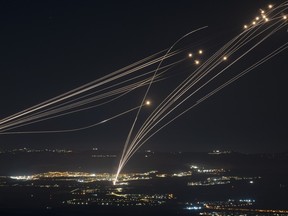Here’s what we know about how Israel could respond and some of the targets the IDF could be considering
Article content
The decades-long shadow war between Israel and Iran has turned into direct confrontation, and the world is still waiting for Israel’s response to a barrage of missiles launched by Tehran.
Meanwhile, the U.S. is investigating the leak of highly classified intelligence documents that reveal Israel’s preparing for a retaliatory attack against Iran. The documents, prepared by the National Geospatial-Intelligence Agency, reportedly include satellite images taken on Oct. 15 and 16 that show the Israeli Air Force conducting exercise drills and repositioning its missiles and weapons.
Advertisement 2
Article content
Tensions have been high since April when Iran launched hundreds of ballistic missiles and drones at Israel in retaliation for an Israel Defense Forces (IDF) strike on an Iranian embassy compound in Damascus, Syria, that killed a senior commander. Israel then retaliated with a limited strike, targeting Iran’s air-defence system in Isfahan.
At the start of this month, Iran took another escalatory step, launching nearly 200 ballistic missiles at Israel in response to the killing of Hezbollah leader Hassan Nasrallah. Israel’s multi-layered air-defence system successfully intercepted the majority of the missiles but Israel vowed to respond.
“Iran made a big mistake tonight,” Israeli Prime Minister Benjamin Netanyahu said following the attack. “And it will pay for it.”
Here’s what we know about how Israel could respond and some of the targets the IDF could be considering.
Recommended from Editorial
Oil fields and refineries
Alex Grinberg, an Iran expert at the Jerusalem Institute for Security and Strategy, told National Post that however Israel chooses to respond,the retaliatory strike should not harm Iranians who do not support the regime.
Article content
Advertisement 3
Article content
“There are very many targets that can be hit without causing suffering to Iranians, because the regime is weak, and without its proxies, it’s only a rather weak country because Iran doesn’t have sufficient conventional military might,” Grinberg said.
Iran is one of the world’s major oil producers, but heavy economic sanctions imposed by the United States and its Western allies, including Canada, significantly limit its ability to sell that oil. The country also ranks second globally, after Russia, in natural gas reserves.
Kharg Island, located in the Persian Gulf, is Iran’s primary crude oil terminal, handling around 90 per cent of the country’s oil exports, mainly to China. Another important facility is Abadan Refinery, near the Iraq border, which primarily serves domestic needs. In the southwest of Iran, Ahvaz oil field is one of the richest globally and reportedly produces an estimated 750,000 barrels per day.
Most of Iran’s gas fields are concentrated in the southern part of the country and in the Persian Gulf.
In an analysis written for Middle East Institute, Colby Connelly, wrote that if Israel decided to target Iran’s oil refining sector, it would have a more limited impact on global markets because it serves the domestic market.
Advertisement 4
Article content
“Although damaging or destroying export infrastructure would surely be the most direct way to limit Iran’s oil revenue, it would also be impossible to avoid some form of a subsequent price spike,” wrote Connelly, who is director of the economic and energy program at Middle East Institute. “Washington is doubtlessly keen to avoid a major jump in oil prices from the loss of Iranian supply, particularly so close to a hotly contested election.”
Nuclear facilities
Iran’s network of nuclear sites is buried deep within mountains, making them nearly unreachable by even the most powerful bombs. Two key facilities, Natanz and Fordow, where Iran is enriching uranium to 60-per-cent purity, are located beneath several dozen metres of rock.
Following Iran’s missile barrage earlier this month, the U.S. stated it does not support an Israeli strike on these nuclear sites. The New York Times has reported that Israel is avoiding targeting Iran’s nuclear facilities.
While this option may be off the table for now, Iran’s nuclear program remains a potential threat to Israel’s security. Iran is reportedly close to being able to develop a nuclear weapon, according to an Institute for Science and International Security report published in January 2024. “It could have enough weapon-grade uranium for six weapons in one month, and after five months of producing weapon-grade uranium, it could have enough for twelve,” the report said.
Advertisement 5
Article content
“Even the Americans cannot destroy the nuclear sites because they are dug inside the mountains, under the earth,” said Grinberg. “The problem is not only to get there and to drop bombs, the problem is to destroy them. So I don’t know how it’s possible.”
Military and covert strikes
Israel is already engaged on two fronts: dismantling Hamas in Gaza and launching strikes on Hezbollah in Lebanon, both key Iranian proxies in the region.
With its advanced arsenal, including F-16 and F-35 fighter jets and sophisticated drones, Israel has the capability to strike deep within Iran, targeting military installations, nuclear facilities, and oil and gas centres.
U.S. sources reportedly told the Washington Post that Israel had informed the U.S. government that strikes against Iran’s oil and nuclear sites are off the table, but that the IDF will target the country’s military assets.
However, targeting Iran’s ballistic missile and drone bases, which are deep underground, poses significant challenges. Experts argue that even the most powerful conventional bombs and missiles may be unable to destroy Iran’s missile and drone factories that are buried under mountains.
Advertisement 6
Article content
Israel could conduct a “combined military operation,” that involves assassinating senior military officials in Iran, cyberattacks, and deploying Israeli special forces to destroy military targets, said Grinberg.
“It’s not only one thing, not only one theatre,” Grinberg explained, using a recent IDF operation in Syria as an example. “They did something very unusual. They not only attacked the Iran missile factory in Syria, (but) special troops also landed in the factory.”
Grinberg said that while he doesn’t think Israel will be able to destroy all of Iran’s missiles, targeting military leadership would “create disorganization.”
“I don’t know how they will command themselves,” he said.
Our website is the place for the latest breaking news, exclusive scoops, longreads and provocative commentary. Please bookmark nationalpost.com and sign up for our daily newsletter, Posted, here.
Article content









